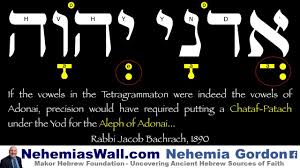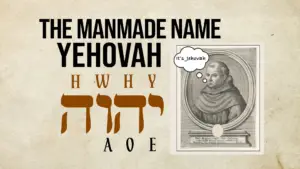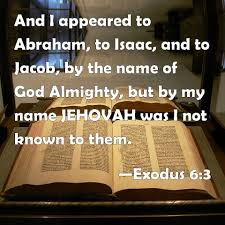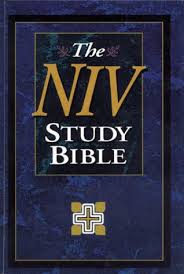
As i feel impressed to produce a Youtube video on the 14 Hebrew names of God, I had to review an anciant discussion on the name Jehovah.
Simple, as backgroud, research tells us:
The word Jehovah originates from the Hebrew Tetragrammaton, YHWH (יהוה), the four-letter name of God in the Hebrew Bible, considered sacred by Jews. This name, often called the “ineffable name,”( Ineffable: too great or extreme to be expressed or described in words) was rarely pronounced aloud due to its holiness; instead, Jews typically used substitutes like “Adonai” (Lord) when reading scriptures.
The form “Jehovah” emerged in medieval Christian scholarship when scribes combined the consonants of YHWH with the vowel markings of Adonai. Hebrew texts used a system called niqqud to indicate vowels, and to remind readers to say “Adonai” instead of YHWH, the vowels of “Adonai” (roughly a-o-a) were added to the Tetragrammaton. This resulted in a hybrid form, YaHoWaH, which was transliterated into Latin as Iehovah or Jehovah by Christian scholars, particularly in the Middle Ages.
The earliest known use of “Jehovah” in this form is attributed to Christian theologians, such as Raymond Martin in the 13th century, with wider use in the Renaissance and Reformation periods. William Tyndale’s 1530 English Bible translation helped popularize “Jehovah” in English, and it appeared in later translations like the King James Bible (1611) in select passages (e.g., Exodus 6:3, Psalm 83:18).
However, modern scholars consider “Jehovah” a mispronunciation, as it doesn’t reflect the original Hebrew pronunciation of YHWH, which is uncertain but often approximated as Yahweh based on ancient sources like Greek transcriptions and theophoric names (e.g., Elijah, from Eliyahu, meaning “my God is Yah”). The exact pronunciation was lost because Jewish tradition avoided vocalizing the name, and Hebrew script lacked vowels until medieval times.
In summary, “Jehovah” is a historical artifact from combining YHWH’s consonants with Adonai’s vowels, used primarily in Christian contexts, but it’s not the original pronunciation of God’s name in the Hebrew Bible.
(Music: Dramatic, mysterious, and slightly suspenseful)
(Visual: An old, leather-bound Bible opens to a page showing ancient Hebrew letters.)
Host (energetic, friendly): You’ve probably heard the name “Jehovah” associated with God. But what if I told you that this name, used by millions of people for centuries, is actually a beautiful mistake? A translation error that reveals a much deeper story about reverence, language, and history. Stick around, and we’ll dive into the surprising origin of “Jehovah.”

Host: The name starts with the most sacred name for God in the Hebrew Bible, written with these four letters: YHWH, known as the Tetragrammaton. This name was considered so holy by the ancient Israelites that they eventually stopped pronouncing it out loud altogether.
Host: But how did we get from an unpronounceable Hebrew name to the English name “Jehovah”? And where can you find it in the Bible today? The answer is a journey through two thousand years of reverence, tradition, and a little bit of confusion.
(Music: Light, historical, and thoughtful.)
(Visual: An animation of a Masoretic scribe carefully adding vowel points to a Hebrew manuscript.)
Host: After the Babylonian exile, a deep sense of reverence developed around God’s name. When a Jewish reader came to the letters YHWH, they wouldn’t say the name. Instead, they would substitute it with the Hebrew word Adonai, meaning “My Lord.”

Host: Hundreds of years later, in the Middle Ages, Jewish scribes called Masoretes created a system of vowel markings to preserve the correct pronunciation of the Hebrew text. When they added vowel marks to the name YHWH, they used the vowels for Adonai as a reminder to the reader to say “Adonai.”

Host: They were essentially leaving a note that said, “Don’t say this name; say Adonai instead.”

Host: This is where the misunderstanding happened. Christian scholars centuries later, in the 13th and 16th centuries, were unfamiliar with this Jewish scribal tradition. They saw the Hebrew text with the consonants for YHWH and the vowels for Adonai underneath.

Host: They combined the two, taking the YHWH and the vowels from Adonai, and came up with a transliteration. They used a “J” instead of a “Y” since Latin had been written that way, and the “W” was replaced with a “V” – creating the name “Jehovah.”

Host: It was a mistake, an accidental invention born out of a scribal shortcut and a lack of context. The name “Jehovah” never actually existed in ancient Hebrew.
(Visual: Quick montage of different Bibles: KJV, ASV, NIV.)
Host: So where is the name “Jehovah” in the Bible? The answer depends entirely on which translation you’re reading.

Host: Early English translations, like the King James Version, did use “Jehovah,” but only in a few places, like Exodus 6:3 and Psalm 83:18. They mostly opted for “the LORD” (in all caps) to represent YHWH, following the same tradition as the Jewish scribes.
Host: However, later translations, like the American Standard Version of 1901, used “Jehovah” thousands of times in the Old Testament, making it the standard rendering for YHWH throughout the text.

Host: Today, most modern English Bibles have gone back to the earlier tradition, using “the LORD” in all capital letters to represent the divine name and preserve the original Hebrew understanding of reverence.

Host: The story of the name “Jehovah” is a fascinating chapter in religious and linguistic history. It’s a reminder of how translations and tradition shape our understanding, and how sometimes, the most well-known words can have the most unexpected origins.
(Visual: Subscribe button, bell icon, and link to another video.)
Host: What do you think about this historical mix-up? Let us know in the comments below! And don’t forget to like this video and subscribe for more surprising stories from history.



